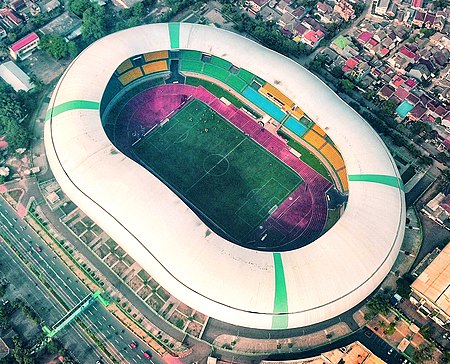Patriot Stadium (Indonesia)

Patriot Candrabhaga Stadium (Indonesian: Stadion Patriot Candrabhaga) is a multi-purpose stadium located in Bekasi, West Java, Indonesia. It is currently used mostly for association football matches. The stadium holds 30,000 people. Patriot Stadium first built as Bekasi Stadium in 1980 with a capacity of only 5,000-10,000 spectators. Since 2011, the stadium is be upgraded into an international stadium. This international standard construction project costs amounted to 450 billion rupiah. Source of funding construction of the stadium itself comes from the Government of Bekasi gradually. This roof stadium grandstand was made of zincalume metal and had a VIP grandstand which can accommodate up to 9,000 spectators and a parking deck which can accommodate thousands of cars and motorcycles. The inauguration ceremony of the stadium expansion was held in conjunction with the 17th anniversary of Bekasi on 10 March 2014. The stadium currently used by Persipasi Bekasi. For the 2017 Liga 1, Bhayangkara F.C. and Persija Jakarta used this stadium for their home matches. The stadium was used for the men's football tournament of the 2018 Asian Games, 2018 AFC U-19 Championship and the 2022 AFF U-19 Youth Championship.
Excerpt from the Wikipedia article Patriot Stadium (Indonesia) (License: CC BY-SA 3.0, Authors, Images).Patriot Stadium (Indonesia)
Jalan Ahmad Yani, Kota Bekasi
Geographical coordinates (GPS) Address External links Nearby Places Show on map
Geographical coordinates (GPS)
| Latitude | Longitude |
|---|---|
| N -6.238358 ° | E 106.991897 ° |
Address
Stadion Patriot Candrabhaga (Stadion Patriot)
Jalan Ahmad Yani
17144 Kota Bekasi
West Java, Indonesia
Open on Google Maps



